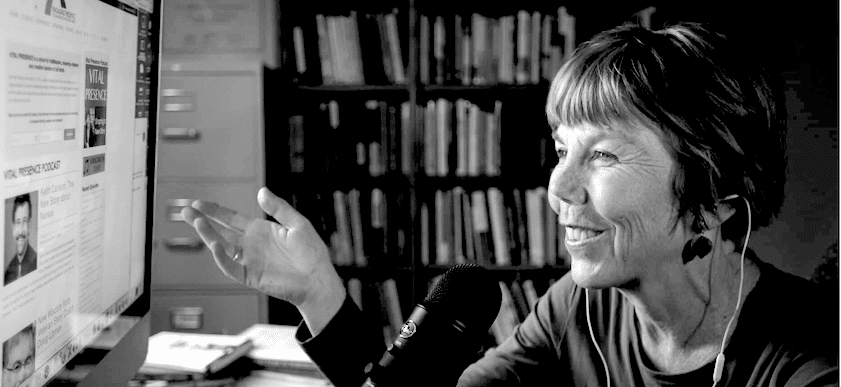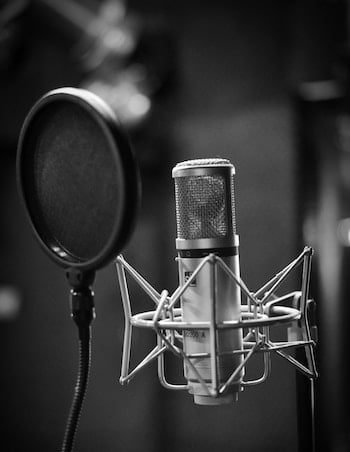
These ideas come from four years of interviewing a captivating group of guests on my Vital Presence podcast. If you’re not recording interviews, adapt these ideas to when you’re being interviewed (it never hurts to know what your interviewer is going through). Or, use them to have a more interesting chat over coffee.
1) Be (really) interested.
I genuinely want to learn about the guests I invite on the show. When I think of my favorite interviewers: Oprah, Krista Tippett, Mark Matousek, they always sound fascinated by their guests. One of Oprah’s great gifts is her ability to make her guests feel special and valuable, and not only because they’re talking with one of the most famous interviewers in the world.
In contrast, I remember being interviewed by a government panel where the interviewers did not make eye contact, the questions were all rote, and no one was allowed to respond to what I said. Talk about nightmarish. My brain froze over!
Being interested in others will also serve you in conversations in gatherings and dinner parties (although parties, alas, are not my forte).
2) Prepare for the interview.
My fabulous friend M. can ignite conversations with total strangers using her boundless interest in others and skills in journalism. She’s also a raving (delightful) extrovert. I like to do extensive preparation–reading an author’s book or researching her or his background. I’m a good improviser (see below) but not that good.
3) Remember the improvisational theatre principle, “Yes, and.”
Conversations are like good tennis volleys–you try not to drop the ball. I never want interviews to sound staged and I don’t give out questions in advance. Very occasionally I may ask guests for suggestions, but I make their questions mine before I use them, if I do.
On the other hand, if a guest rambles on too long, it’s hard to keep up the volley (remember this at parties!).
4) Another improv principle: make your guests feel great.
You aren’t obliged to do this as an interviewer, but hey, people are giving you their time, so why not acknowledge the cool thing they said? Fortunately, you don’t have to be moribund and “objective” like those government interviewers.
Follow your heart. When you’re moved, say so. Laughing, I’ve discovered, also helps!
5) Steer clear of spiel.
Super-interviewer https://www.npr.org/programs/fresh-air/ (who, in my book, represents the gold standard for interviewers,) stays away from interviewing politicians because they almost always are wedded to their campaigns and talking points. One of my least favorite interviews was with a very articulate guest, who never gave me anything he hadn’t said dozens of times before.
I try to steer a conversation that drags or goes off point, without abruptly interrupting a guest, though I’ve been tempted. Instead, I rely on post-production editing to shorten a ramble. I don’t want guests to be marketing themselves mid-interview; I always leave time for them to promote themselves at the end.
 6) Sounding natural is unnatural until it gets natural.
6) Sounding natural is unnatural until it gets natural.
One of the high bars I strive for is to sound like myself: positive, interested and relaxed. The great podcast interviewer https://onbeing.org/series/podcast/said it took her five years before she felt “natural” on air. After four years, it’s finally becoming easier for me. Funny to have to work on becoming “natural,” but that’s how it’s been.
When you’re recording, you’re in a forced situation. Nothing is natural about wearing a headset, speaking into a mic, asking a set of tentative questions, keeping the conversation going without sounding dumb, and worrying about the barking dog outside. The more you interview, the more these worries go into the background.
When you’re not recording, you have an advantage. Remembering to relax, breathe, smile and pause will take you far.
7) Keep an easy tempo.
I once found myself in conversation with someone who spoke a mile a minute. My memories of living in Manhatten kicked in and it was off to the races. Listening to that interview, I became exhausted. These days, I may alter my tempo a little to match a guest, but I still need to use the tips above: relax, breathe, smile and pause.
8) Distractions matter, but not as much as you think, if you stay focused on the guest.
I used to be SO worried about distracting noises–my chair squeaking, the cat meowing, or my guest making some bizarre rattling noise (always a concern). I’ve discovered that I can either splice out most distractions and interruptions or figure that my audience won’t mind when my guest’s dog barks or their kids arrive home from school.
That doesn’t apply, however, to my dog Winston, who, without a moment’s notice becomes a barking, canine tornado. Mr. W. now sits out interviews in his crate.
If my guest was sitting in a sound-proof recording studio with top equipment, and I was, too, my standards might be different. But then, we’d call ourselves NPR (National Public Radio).
Whether it’s on-air, or over coffee, interviewing is fun. As with any skill, you get better with practice.
Just be curious, follow your nose, have fun, and (always) listen to your heart.
(If you have specific questions about translating these ideas into conversations, drop me a comment.)


 6) Sounding natural is unnatural until it gets natural.
6) Sounding natural is unnatural until it gets natural. 







